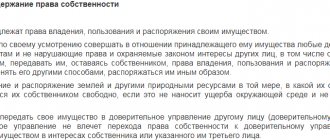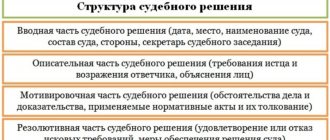Article 170. Invalidity of imaginary and feigned transactions
Ruling of the Supreme Court of the Russian Federation dated January 10, 2019 N 302-ES18-8503(2) in case N A33-5891/2017 When resolving the dispute, the courts of first and appellate instances assessed the evidence presented according to the rules of Chapter 7 of the Arbitration Procedural Code of the Russian Federation and guided by the provisions of the articles 4, 16, 19, 100 of the Federal Law of October 26, 2002 N 127-FZ “On Insolvency (Bankruptcy)”, proceeded from the fact that the company’s claims based on borrowed relations (taking into account the new obligation) arose as a result of the actions of affiliated persons when the right is abused for the purpose of increasing the authorized capital (clause 2 of Article 170 of the Civil Code of the Russian Federation), and therefore such claims are of a corporate nature, which prevents their inclusion in the register of creditors’ claims.
Determination of the Judicial Collegium for Economic Disputes of the Supreme Court of the Russian Federation dated January 31, 2019 N 304-ES17-21966(3) in case N A45-27225/2016
Since cover transactions are void (clause 2 of Article 170 of the Civil Code of the Russian Federation), and according to the cover transaction Maksimov V.V. fulfilled his obligations without receiving counter-provision in the form of transfer of rights to apartment No. 408, the court of first instance correctly included the requirement of V.V. Maksimov. to the register of claims for the transfer of residential premises (Article 201.7 of the Bankruptcy Law).
Ruling of the Supreme Court of the Russian Federation dated 02/04/2019 N 304-ES18-24278 in case N A27-12750/2015
When resolving a separate dispute, the courts, based on an assessment of the evidence presented in the case in accordance with the rules of Chapter 7 of the Arbitration Procedural Code of the Russian Federation, guided by Articles 167, 168, 170, 181 of the Civil Code of the Russian Federation, Articles 61.2, 61.6, 213.32 of the Federal Law dated 26.10 .2002 N 127-FZ “On Insolvency (Bankruptcy)”, explanations set out in the resolution of the Plenum of the Supreme Arbitration Court of the Russian Federation dated December 23, 2010 N “On some issues related to the application of Chapter III.1 of the Federal Law “On Insolvency (Bankruptcy)” ", proceeded from the sham of the disputed transaction, concluded with abuse of law to the detriment of the interests of creditors in order to exclude the possibility of foreclosure on the debtor's property through a formal change of owner.
Ruling of the Supreme Court of the Russian Federation dated January 22, 2019 N 309-ES18-23138 in case N A60-39658/2017
The courts of the first and appellate instances, having assessed, according to the rules of Article 71 of the Arbitration Procedural Code of the Russian Federation, the evidence presented in the case materials, guided by Articles 129, 166, 168, 170 of the Civil Code of the Russian Federation, the explanations given in paragraph 86 of the resolution of the Plenum of the Supreme Court of the Russian Federation dated 06/23/2015 N “On the application of certain provisions of Section I of Part One of the Civil Code of the Russian Federation”, they refused to satisfy the stated requirements, without establishing the presence of signs of sham of the disputed transactions, and also pointing out the lack of evidence indicating that the parties to the transactions acted exclusively with intent to cause harm to the plaintiff or abused the right in other forms.
Determination of the Judicial Collegium for Economic Disputes of the Supreme Court of the Russian Federation dated February 11, 2019 N 305-ES16-20779(32) in case N A40-154909/2015
Moreover, the creditors based their claims on the fact that the agreement dated November 29, 2016, concluded following the auction, was of a sham nature and, along with subsequent transactions, covered up the sale of property not to Sovcombank, but to other persons who did not have the right to take part in the auction. According to paragraph 2 of Article 170 of the Civil Code of the Russian Federation, a sham transaction, that is, a transaction that was made with the aim of covering up another transaction, including a transaction on different terms, is void. The limitation period for claims to invalidate a void transaction is three years (clause 1 of Article 181 of this Code). Thus, from the point of view of sham, the statute of limitations within the framework of this separate dispute was not missed in any case, since the claim was submitted by the creditors on November 24, 2017.
Ruling of the Supreme Court of the Russian Federation dated 02/07/2019 N 301-ES18-18888(2) in case N A43-27419/2015
Satisfying the requirements, the appellate court, based on an assessment of the evidence presented in the case in accordance with the rules of Chapter 7 of the Arbitration Procedural Code of the Russian Federation, including the expert’s conclusion dated October 17, 2012 N 2012-1071-ZS, the circumstances established during the consideration of case N A40- 91932/2008 of the Moscow Arbitration Court, guided by the provisions of articles , , 166, 168, 170, 454, 549, 551 of the Civil Code of the Russian Federation, articles 2, 3, 6, 19, 61.1 61.3, 61.6 of the Federal Law of October 26, 2002 N 127 -FZ “On Insolvency (Bankruptcy)”, the position set out in paragraph 10 of the Resolution of the Plenum of the Supreme Arbitration Court of the Russian Federation dated April 30, 2009 N “On some issues related to challenging transactions on the grounds provided for by the Federal Law “On Insolvency (Bankruptcy)” , paragraphs 4 - 8, 25 of the resolution of the Plenum of the Supreme Arbitration Court of the Russian Federation dated December 23, 2010 N “On some issues related to the application of Chapter III.I of the Federal Law “On Insolvency (Bankruptcy)”, proceeded from the imaginary nature of the controversial transactions, having established the fact of their committed by interested parties without the intention of the emergence, change, termination of civil rights and obligations as a result of these transactions, but with the unlawful purpose of causing harm to the property rights of the debtor’s creditors in the form of withdrawal of the latter’s assets and preventing foreclosure on said property; applied the consequences of invalidity of transactions.
Determination of the Judicial Collegium for Civil Cases of the Supreme Court of the Russian Federation dated January 29, 2019 N 4-КГ18-93
The plaintiff referred to the fact that after the divorce he became aware of the defendant’s serious illness, while the family relationship between them actually continued. In order to create psychological comfort for the defendant, conducive to healing, he decided to re-register the specified real estate in the name of his ex-wife. June 3, 2014 between Medvedev S.N. and Medvedeva E.V. a purchase and sale agreement was concluded for the specified land plots and residential buildings. This agreement was not aimed at creating legal consequences, the funds under the agreement were not paid to him, in fact, the real estate was not transferred to the defendant, the burden of maintaining the property continued to be borne by S.N. Medvedev. Referring to the provisions of paragraph 1 of Article 166, Article 167, paragraph 1 of Article 170 of the Civil Code of the Russian Federation, he asked to recognize the specified transaction as imaginary and satisfy the stated claims.
Ruling of the Supreme Court of the Russian Federation dated February 15, 2019 N 305-ES18-25188 in case N A40-192801/2017
Satisfying the requirements of the company (the only participant of TradeCenter LLC), the courts, guided by the provisions of Articles 167, 168, 170 of the Civil Code of the Russian Federation, Federal Law of 02/08/1998 N 14-FZ “On Limited Liability Companies”, clarifications contained in the resolution of the Plenum of the Supreme Arbitration Court of the Russian Federation dated May 16, 2014 N “On some issues related to challenging major transactions and interested party transactions”, Resolution of the Plenum of the Supreme Court of the Russian Federation dated June 23, 2015 N “On the application by courts of certain provisions of Section I Part One of the Civil Code of the Russian Federation The Federations proceeded from the fact that the disputed transaction was large for TradeCenter LLC, was made in violation of the procedure for approving large transactions and would entail losses for TradeCenter LLC.
Ruling of the Supreme Court of the Russian Federation dated February 15, 2019 N 304-ES18-6043(3) in case N A03-2586/2017
In resolving the dispute and satisfying the stated demands, the courts were guided by the provisions of Articles 168 and 170 of the Civil Code of the Russian Federation and proceeded from the fact that the contested transaction mediated the withdrawal of the debtor’s assets in favor of an affiliated person (participant) to the detriment of creditors. At the same time, the courts rejected objections about the passage of the limitation period, including with reference to paragraph 10 of the resolution of the Plenum of the Supreme Arbitration Court of the Russian Federation dated April 30, 2009 N “On some issues related to challenging transactions on the grounds provided for by the Federal Law “On Insolvency (Bankruptcy”) )".
Determination of the Judicial Collegium for Civil Cases of the Supreme Court of the Russian Federation dated February 19, 2019 N 18-КГ18-257
In support of the requirements, pointing out that the financial situation of Chirvin A.V. as a guarantor did not allow him to fulfill his obligations under the loan agreement, since his salary at Agromir LLC did not exceed 25,000 rubles. per month, in connection with which, these guarantee agreements are imaginary transactions in accordance with paragraph 1 of Article 170 of the Civil Code of the Russian Federation.
Ruling of the Supreme Court of the Russian Federation dated February 25, 2019 No. 304-ES18-18874(2) in case No. A27-5085/2017
Recognizing the claim of the bankruptcy trustee as justified, the courts of the first and appellate instances, having assessed the evidence presented in accordance with the provisions of Article 71 of the Arbitration Procedural Code of the Russian Federation, were guided by Article 170 of the Civil Code of the Russian Federation, the provisions of Chapter III.1 of the Federal Law of October 26, 2002 N 127-FZ “On insolvency (bankruptcy)” and proceeded from the fact that the applicant provided sufficient evidence of the nullity of the controversial real estate purchase and sale transactions, as executed to cover up a transaction for the gratuitous withdrawal of the debtor’s asset, which is also invalid.
What agreements are void under the law?
The following types fall under this definition:
- any concluded with intentions contrary to the fundamentals of morality and law and order - under Art. 169;
- both options we are considering are under Art. 170;
- signed by incapacitated or minor persons (Articles 171 and 172, respectively);
- allowing violations in the text of the contract, automatically entailing the invalidity of the document - under Art. 162;
- those who do not comply with notarial norms and/or state registration requirements - under Art. 165.
The regulator in all cases is the Civil Code of the Russian Federation: guided by it, experienced lawyers quickly identify obvious and simple cases, and in more complex situations it is necessary to collect a convincing evidence base.
○ Advice from a lawyer:
✔ Is it possible to recognize a transaction as imaginary if a gift agreement is concluded between mother and daughter? The acceptance and transfer act was not drawn up; the bills for the apartment are paid by the mother.
If the daughter has not paid the tax on the property received, this is grounds for invalidating the transaction and evading the law.
✔ Does a pretend deal really consist of two parts – a real deal and a pretend deal covering it?
It does not consist of two documentary parts. The contract is concluded only for that part of the agreement that the parties want to fix. It's called feigned. But the real transaction is completed without written confirmation. For example, a purchase and sale agreement was concluded for an apartment for 1 million rubles, but in fact the seller received 1.5 million from the buyer. Here, the concluded purchase and sale agreement covers the oral agreement of the parties with each other.
Video
Specialist Oksana Degtyareva will tell you in detail about feigned and imaginary transactions and in what cases they are invalid.
Published by: Vadim Kalyuzhny , specialist of the TopYurist.RU portal
○ How to prove the feud or imaginary nature of a transaction?
By themselves, these two types of transactions are invalid from the moment they are concluded because they do not comply with the law. However, this fact can only be officially recognized by going to court.
✔ Statement of claim to court.
The application is drawn up in free form, indicating the following information:
- Details of the recipient of the document.
- Details of the plaintiff and defendant.
- The essence of the appeal is an indication of an invalid transaction.
- Bringing evidence.
- Please recognize the contract as void and compensate the injured party for damages.
- List of applications.
- Date and signature.
The peculiarity of the claim is that its price is determined on the basis of the value of the property that became the subject of the dispute. The application can be submitted by one of the parties to the transaction or any person whose rights and legitimate interests have been affected as a result of the conclusion of the agreement.
✔ Evidence base.
The success of the trial directly depends on the quantity and quality of evidence presented. Their role can be played by:
- Audio/video materials.
- Correspondence with the defendant.
- Witness's testimonies.
- Documentation confirming the illegal transaction (for example, indicating that the former owner remained the beneficial owner).
Thus, invalid transactions, which include imaginary and feigned ones, are concluded in violation of the laws. Therefore, responsibility for their implementation falls on each participant who knew about the completion of such a transaction, but did not in any way prevent the signing of the agreement.






